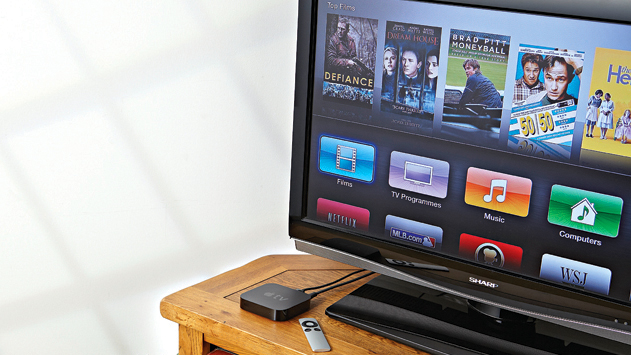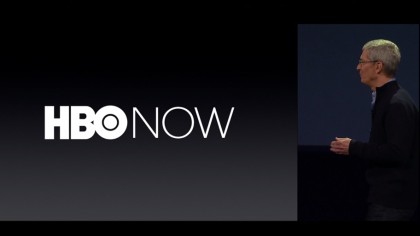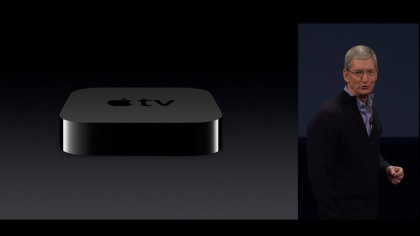Apple still hasn't 'fixed' TV, but maybe I'm OK with that
Does TV even need fixing?

If you're the sort of person that watches Apple keynotes, you will probably recognise the little tingle of anticipation I felt when Tim Cook started talking about the Apple TV in the company's most recent presentation. Here we go, you think, it's time for The Apple TV Segment, and since we all know the current generation is well overdue an update, this is going to be exciting!
As it turned out, of course, it wasn't. The Apple TV box remains the same as it's been for three years (five, if you're just looking at the industrial design and basic intention). While it's had a welcome price cut to £59 (US$69, AU$109), this was probably more to do with staving off competition from Roku and Chromecast, and moving it into the 'why not?' price bracket for folks who'd been on the fence, than about any genuine innovation.
We also got HBO Now, a 'cable cutting' alternative that will give you access to US TV channel HBO's catalogue of programmes. Well, I say 'we' got and gives 'you' access to, but of course it's US only, so if you're not based in the States (or prepared to fiddle with DNS and proxy settings), 'you' get diddly squat.

None of this was compelling for most Apple fans. We want Apple to 'fix' TV. We want to be wowed and we want to be excited, we want to be presented with solutions to problems we didn't even know we had. People who love Apple more or less trust that it's the company that can actually pull this off.
Thing is, though, the Apple TV is done – complete. The reason it's received no major hardware upgrade for half a decade is that the basic black puck easily did everything Apple set out to do with it. It's a really simple device: it has a network connection and AV-out. It's used for playing video and audio. You want it to get newer processors? It doesn't need them; the single-core A5 processor is easily good enough for playing back 1080p movies.
Which is to say, we need to get out of the habit of demanding companies update things just for the sake of it. It's an understandable compulsion – I love novelty as much as the next person standing in line at the Apple Store – but in the case of the Apple TV, it has for a long time been as capable a platform as Apple needs it to be to fulfil its vision for it. If what you want is a movie-playing box, it doesn't need very much grunt.
To directly address the few of you who are screaming '3D!' and '4K!' at me through your screens: yeah, sure. If you want these things, you'll need a bit more poke, but until there's a ton of content for these ready to roll on the iTunes Store, Apple won't care about either technology, and there are no signs that this is imminent. (Also, would you like a hug?)
Sign up for breaking news, reviews, opinion, top tech deals, and more.
There is, however, a looming 'but' and it's that while the Apple TV as it stands easily fulfils Apple's current vision for the platform, there's nothing stopping you being dissatisfied with that vision. Just why hasn't Apple 'fixed' TV? Is it because it doesn't know how?
Is it because the TV and movie industries, aware of the fate that befell the music industry at Apple's hands – ceding its control, for better or worse – are being particularly cautious? Is it because everyone's more primed to see Apple as a threat now and that there are many more potential players in the market now, hindering its ability to innovate behind the scenes? I don't know.

I honestly don't even know what 'fixed' TV would look like. Yes, we all seem to want internet-delivered, à la carte, unbundled access to any show anywhere in the world, and most of us accept that this has to be paid for somewhere, but even if that is indeed the solution then the problem is that for us to get there, the entire TV industry has to change. This is a business problem, I think, not a technology one, and it's not clear yet what power Apple has as a broker to solve it.
The Wall Street Journal has reported that Apple may unveil a streaming service – with a 'lite' bundle of channels from the likes of ABC, CBS and Fox – as early as June, to run both on the Apple TV and iOS devices.
Is that enough to fix TV? For starters, it's likely to be US-only again – understandable, but hardly a solution that works for everyone – but business stuff still gets in the way. It's reported that talks with Comcast have broken down, so channels owned by NBCUniversal wouldn't be offered, and while the reported bundle would feature big-ticket channels such as ESPN, CBS and FX, lots of the smaller networks that would fill out a standard cable TV package would also be missing.
Perhaps the future of the Apple TV box actually isn't even 'TV' at all. After all, you could argue that the iPhone's least important feature is its phone, and the Apple Watch's least important feature is its watch. Maybe the Apple TV will be a Trojan horse for Apple to get into the living room, but the TV won't be the thing we really use it for. We already know that the Apple TV will play a part in HomeKit, Apple's smart home technology, so that could suddenly turn out to be its draw.
Or indeed, it could be something I can't even imagine, and if I'm honest, that's what excites me about Apple – or Google, or Microsoft, or a two-bit startup on Kickstarter. It's that moment in a keynote when the person on stage starts talking about a product or a problem, and you get that tingle that tells you something important is going to change in some pretty fundamental ways.
Apple didn't do it this time with the Apple TV, but it might soon, and I'll be watching, ready to be delighted. If it doesn't, in this market that's so ripe for disruption, then it might have to sit by and watch, as another company defines how we watch TV for the next few decades.